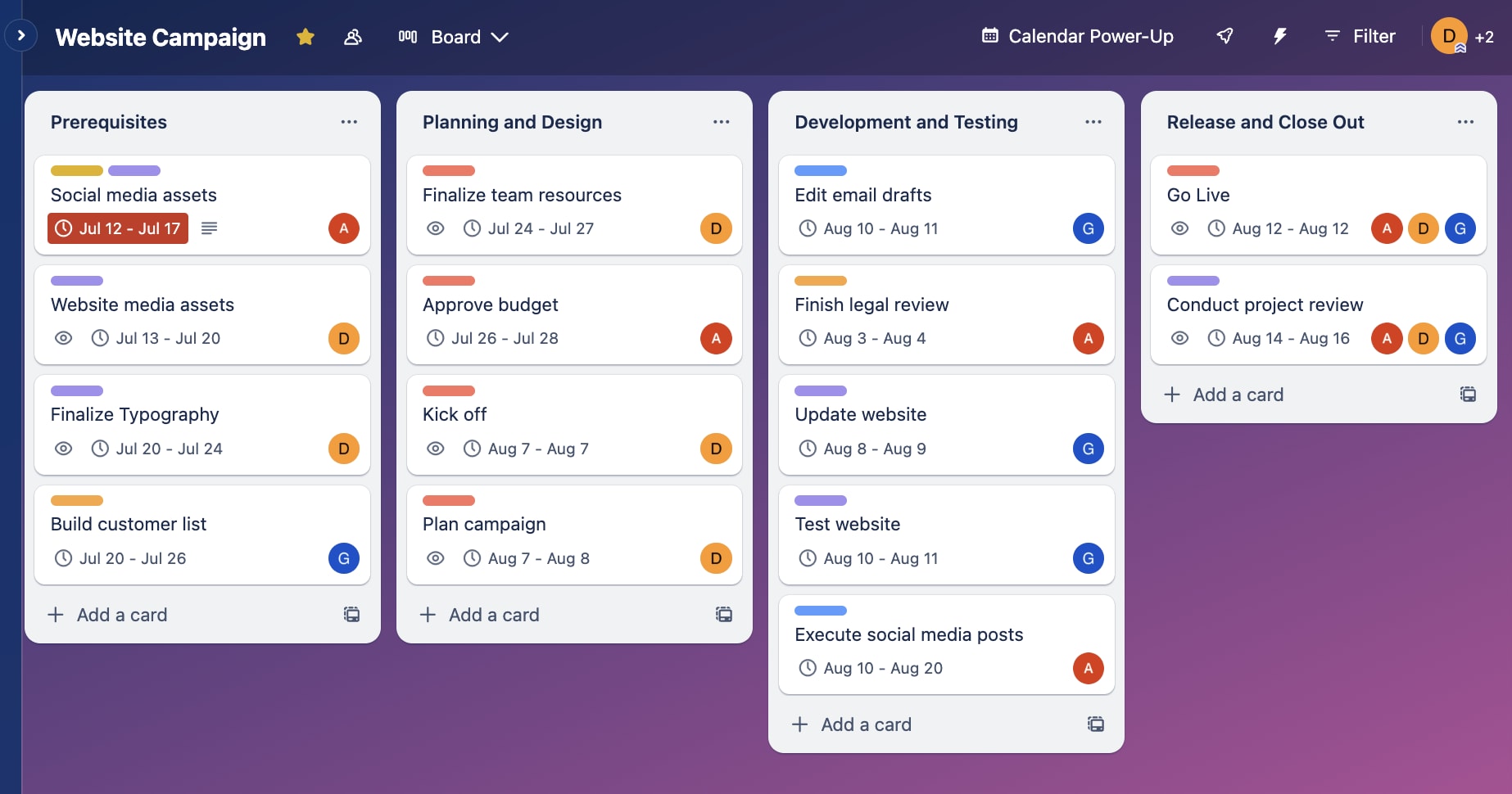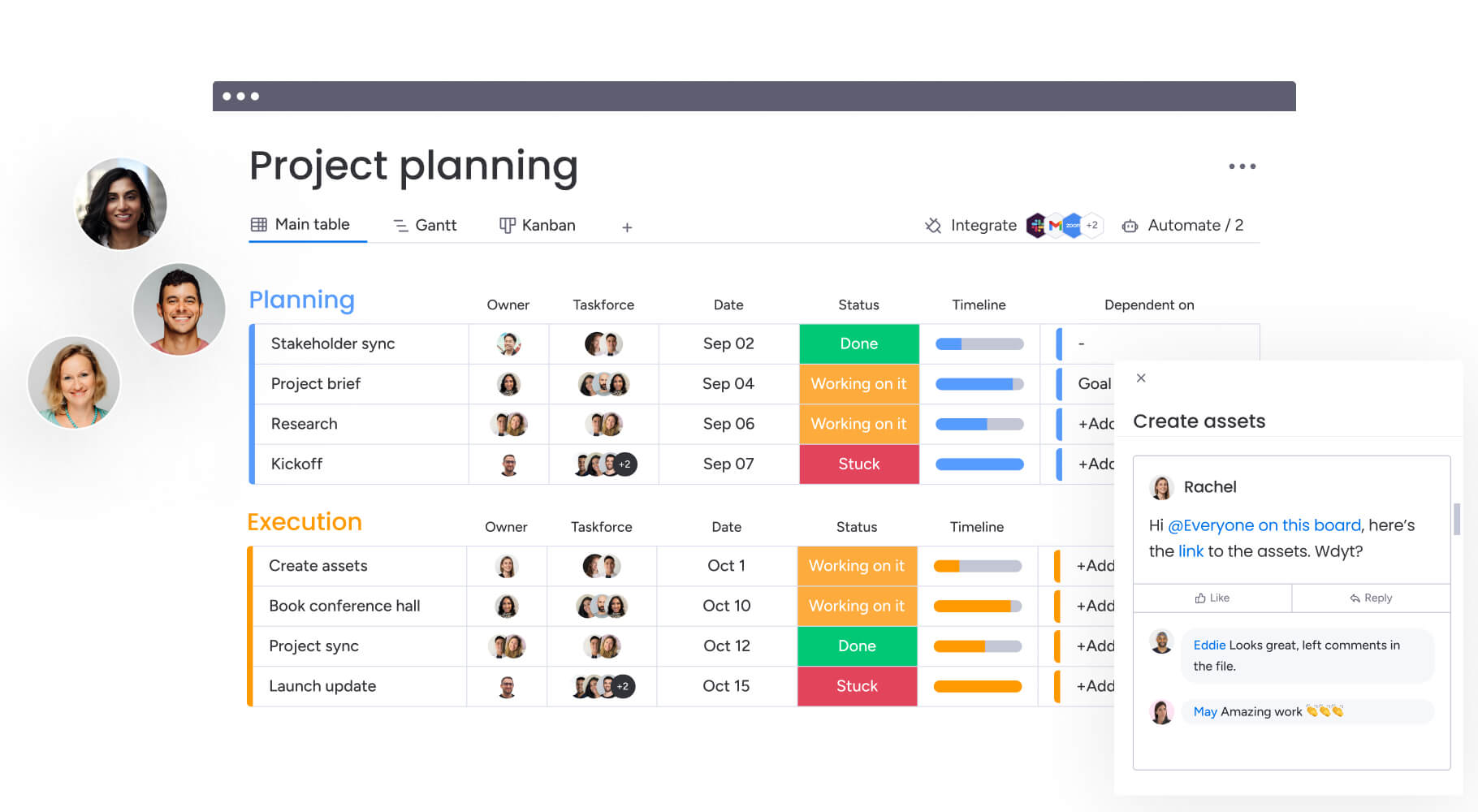If you’re shopping around for an efficient project management platform, it’s likely that Trello and monday.com are already on your radar. As two popular cloud-based solutions on the market for organizing tasks and projects, collaborating with teammates, and integrating with other tools in your tech stack, it can be tricky to hone in on which platform is best for your team.
Both are great options for managing your work, but each is also more fitting to specific requirements and scenarios. Trello, with its simple Kanban card and column format, is as simple as it gets, but monday work management, built on the powerful monday.com Work OS, offers more robustness while still keeping the platform easy to use.
In this blog post, we’ll review the two side by side and dig deeper into the details of each platform’s features, pricing, and third-party reviews to determine the right fit for your business.
Trello vs monday work management: At a glance
Trello is suited to simple, small-scale projects. monday work management, on the other hand, can manage and organize everything you do at work – from projects to workflows to customer relationships and everything in between. Here’s a look at the two project management software platforms side by side to give you a quick overview of how they stack up.
| Trello | monday work management | |
|---|---|---|
| Pricing | Free forever plan, paid plans from $5/user/month | Free 14-day trial, paid plans from $9/seat/month |
| Features | Kanban-style boards with lists, and cards Checklists and due date setting Create quick automations with Butler | Customized dashboards with drag-and-drop widgets Advanced custom no-code automations Seamless communication and collaboration tools |
| Ease of use | Simple and quick to learn and get started using a drag-and-drop interface | Easy to use without sacrificing high-level capabilities and tons of customization option |
| Integrations | 200+ integrations available | 200+ integrations available |
| Storage | Unlimited (with 10-250GB file limit depending on plan) | 5-1000 GB depending on plan |
| Work views | 7 views, such as Dashboard, Timeline, Map, Calendar, and more | 27 different views including Gantt, Timeline, Chart, Kanban, Calendar, Workload, and more |
| Support | Support depending on plan, with 24/7 support only available to Enterprise customers | 24/7 customer support on all plans, knowledge base, daily webinars, and dedicated customer success manager and 99.9% uptime SLA for Enterprise customers |
| Additional products | None | monday CRM monday dev monday service |
| Customer reviews | 4.4/5 from G2 reviewers | 4.7/5 from G2 reviewers |
monday work management is packed with intuitive features
Trello’s simplicity means that it offers fewer features than monday work management. For this reason, Trello may appeal to smaller teams or single users, while monday work management offers limitless functionality suitable for organizations of any size or type. Here’s what both platforms have to offer.
Trello’s features
Trello offers a range of features that fit into the Kanban style of project management. These include:
- Boards, lists, and cards: These define the core structure of Trello, where boards represent projects, lists denote stages or categories, and cards are individual tasks that you can add customizations like color-coded labels, to-do lists, deadlines, assign users, and more

- Automated notifications with Butler: In Trello, the Butler feature allows you to create easy automations to send real-time task notifications, change the status of a card, notify a team member, or complete other manual tasks
- Multiple work views: Not a fan of Kanban? No problem. While that is Trello’s claim-to-fame, you can also easily access other work views like timeline, table, calendar, map, and more

monday work management features
monday work management is the ultimate project management platform, offering plenty of features to organize your workflows and customer relationships. In addition to many of Trello’s features, monday work management also offers these advanced capabilities:
- Customized dashboards: Make data-driven decisions by building dashboards using drag-and-drop widgets for a high-level view of everything that you and your team are working on

- Multiple work views: Choose from 27+ views, including Trello’s favorite Kanban View, as well as Gantt, Calendar, Timeline, Map, and Chart Views for a holistic overview of your projects from the angle that makes the most sense to you
- Advanced automations: monday work management’s built-in automation tools enable you to automate recurring tasks and customize workflows according to your team’s needs, such as notifications when someone completes a task

- Streamlined collaboration: Eliminates the need for long email threads and unnecessary meetings by centralizing all communication and files in one place so you never miss any key information
monday work management offers intuitive, no-code integrations
As powerful as both platforms are on their own, you’ll probably want to use them alongside other tools you already know and love. Here’s how you can integrate each platform with your existing tech stack and put an end to constant tool-switching:
Trello’s integrations
Trello’s integrations are a main feature of the platform, integrating with 200+ other tools like Jira, Slack, or Gmail to extend its functionality. Once connected to your preferred tech stack, you can use Trello’s inbuilt automation tool called Butler to create rules, buttons, and commands to handle workflows like automatically posting Trello conversations in Slack channels or creating new Jira tickets.
monday work management integrations

monday work management offers 200+ app integrations that you can set up in just a few clicks, with no coding required. Keep all the data you need in one place, and seamlessly connect your boards with tools for every type of work, including:
- Communication such as Microsoft Teams or Gmail
- Collaboration such as Zoom, Google Calendar, and Google Drive
- Marketing such as MailChimp or HubSpot
- CRM and Finance such as Docusign or Salesforce
- Development such as GitLab or Jira
monday work management will give you more bang for your buck
Both Trello and monday work management have free plans or trials which is a great jumping-off point to discover the capabilities of each platform. However, to really get the functionality of either platform, you’ll likely need to opt for one of the higher tiers. Here’s what you can expect at each price point:
Trello pricing
Trello pricing is based on four different plans:
- Free: $0 forever, aimed at individuals and small teams. It includes unlimited cards, up to 10 boards per workspace, unlimited Power-Ups per board, and unlimited storage (10MB per file)
- Standard: From $5 per user/month, aimed at teams that need to scale collaboration. It includes unlimited boards, advanced checklists, custom fields, and unlimited storage (250MB per file)
- Premium: From $10 per user/month, aimed at teams that need better visualization. It includes extra views, unlimited workspace command runs, admin and security features, workspace-level templates, etc.
- Enterprise: From $17.50 per user/month, aimed at larger organizations with cross-functional teams who need advanced security and controls
monday work management pricing
In addition to a free 14-day trial, monday work management pricing includes four different plans:
- Basic: From $9 per seat/month, aimed at solopreneurs, or small teams. It includes unlimited items, docs, boards, 36+ column types, 200+ templates, and a Kanban board as an alternative to using Trello
- Standard: From $12 per seat/month, aimed at mid-sized teams who want to create dashboards of up to 5 boards. It includes extended views, such as Timeline, Gantt, and Calendar Views, integrations, automations, and guest access permissions
- Pro: From $19 per seat/month, aimed at teams with more complex workflows who need visibility of up to 10 boards. Expect private boards, docs, formula columns, integrations, automations, time tracking, and a Chart View at this level
- Enterprise: Custom pricing is available on request requiring dashboards of up to 50 boards. This price plan includes advanced security and analytics
monday work management offers 24/7 customer support on all plans
No one likes struggling to find a customer support phone number or being put on hold for hours. If you have a query, need onboarding assistance, or run into technical difficulties, it’s always reassuring to know help is at hand. So, what type of customer support do Trello and monday.com offer?
Trello’s customer support
Trello’s customer support depends on the type of plan you’re on. The popular free plan offers community support only, which is something you should factor in if you’re considering using this for your small business. Standard plan users can access support during local business hours, while premium plan users may access customer support 24/5. Only enterprise customers can call for support 24/7.
monday.com’s customer support
monday work management offers consistent customer support across all premium plans, with everyone on basic, standard, and pro plans having access to resources on the self-serve knowledge base. Users can also attend daily live webinars and call customer support 24/7.
Enterprise customers have a higher level of support with a dedicated customer success manager and a service-level agreement (SLA) promising 99.9% uptime, meaning you can expect access to the platform at all times.
Get startedmonday work management ranks higher for G2 customer reviews
When researching any type of software, one of the best ways to evaluate its suitability for your business is to check out how other customers have experienced it. There are various review and comparison sites that can help you with this, including G2 and TrustRadius. Both platforms score well with customers, with monday.com receiving a higher overall score.
Trello’s customer reviews
On popular review site, G2, Trello is rated as 4.4/5 by more than 13,000 users. Users note that the platform is an “indispensable tool for project management” and has an “intuitive task panel.” Some users mention that the platform has more limited features than what other more comprehensive tools offer (for example time tracking, budgeting, etc.).

monday work management reviews
monday.com has a rating of 4.7/5 on G2 from more than 12,000 users. Users note that monday.com is “the secret to success,” and allows them to “automate any task in any environment.” Users also say that the platform is super flexible, has great integrations, a user-friendly interface, and amazing customer service. It also receives high scores in the following categories: 94% in Likelihood to Recommend, 93% in Ease of Doing Business With, and 92% in both Quality of Support and Ease of Use.
Trello vs monday work management: Which is right for you?
No team or manager has identical needs. Your choice of project management tool will boil down to your unique requirements such as your team size, budget, preferred project management methodologies, task types, or integrations with a specific tool in your tech stack. So, which is the best choice for your business? The answer depends.
Trello might be better for you if:
- You want a Kanban-style platform with simple drag-and-drop features
- You have a small team or work independently
- You’re looking for a platform that you can jump into quickly
- You want to stick to a small budget or even 0$
Go with monday work management if:
- You want the flexibility to customize a tool to your liking
- You want a robust platform with no-code automations for simple or more complex work management
- You’re looking to get insights and analytics on your projects to optimize team performance
- You want a standalone product that can also connect with more platforms, such as monday CRM or monday dev to run other areas of your business
- You want access to 24/7 customer support
Essentially, your choice comes down to what you’re looking for. Both platforms will help you manage your tasks and work, but Trello’s is better for non-technical users who value simplicity over everything, while monday work management is an all-encompassing platform that allows you to shape the tools you need for seamless project management.
If your team is growing and you want a platform that will scale with you, you might find that you’re going to outgrow Trello pretty quickly. monday work management is flexible enough to accommodate small teams to large enterprises, growing with your team so the platform you’re working with adjusts to your company’s needs as they evolve.
